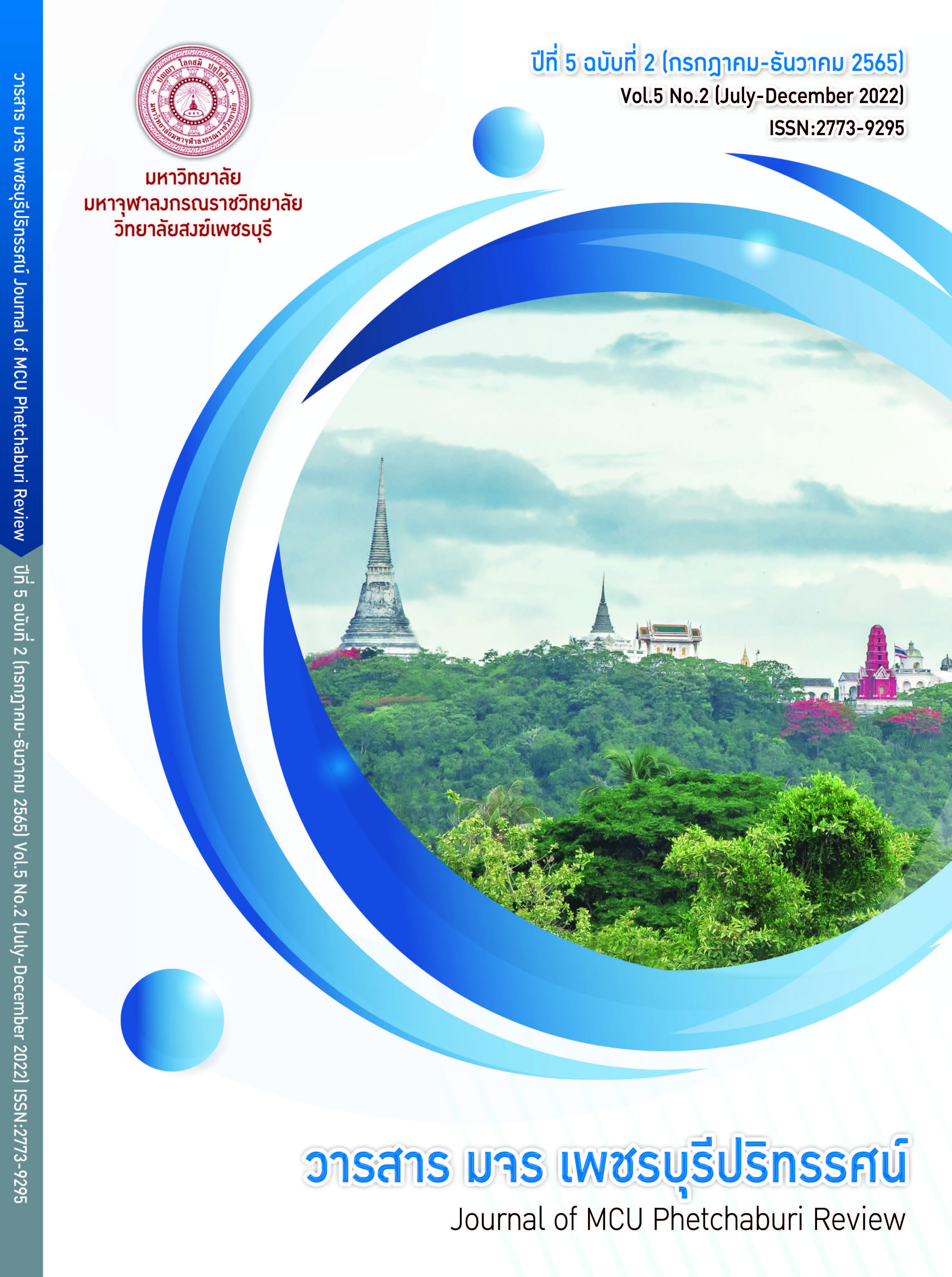THE INTEGRATION OF THE DHAMMĀDHIPATEYYA FOR PROMOTING YOUTH’S POLITICAL AWARENESS IN THE DEMOCRATIC SYSTEM IN PHETCHABURI PROVINCE
Main Article Content
Abstract
The objectives of this research were 1) to study the general condition and problems and obstacles, 2) to study the factors affecting political awakening, and 3) to propose a model of integration of the principles of Dhammadhipataya. Using mixed research methods, that is, qualitative research. There were 20 key informants or people and a specific group discussion of 10 images or people by descriptive data analysis. and quantitative research A sample of 397 people was used.
The results showed that
- General conditions and problems and obstacles in promoting political awakening in a democratic system, ie youth living in political groups Political families have political interests. Agricultural domiciles and rural societies are quite conservative. Moderately financially wealthy families may have periods of interest in politics. Families with lower middle class economy believe that he has no political power And political influence has always played a role in Thai society. Young politicians are motivated by campaign policies. and mainstream political parties Quantitatively, the overall picture was at a high level ( = 3.66).
- Factors affecting the political awakening in the democratic system of youth in Phetchaburi province found that following and listening to political news through various types of sources and media, and family members encouraged them to participate in political activities. The institute has courses, content, and teaching related to politics and government. and guidelines for the practice of democracy Teachers/instructors encourage activities and educational institutions provide the opportunity to express their opinions freely. and express creative freedom Stimulate important political issues through various media. Participate in discussions on political issues with community members. and people in the community have the opportunity to express constructive opinions Political communication through social media such as Facebook, LINE, Twitter that journalism plays an important role in enhancing knowledge, ideas, beliefs, values and political ideology. and politicians and political parties plays an important role in creating values and political ideology The Council of Ministers and the administrative institutions are involved in stimulating and pushing for political expression in a democratic way. and political institutions provide opportunities to participate in solving electoral problems.
Factors contributing to youth political awakening overall (X1) was moderately correlated at -0.52 (rx1y) and in the opposite direction. As for the principle of Aparhaniyadhamma 7, promoting political arousal among youth, overall (X2) had a moderate correlation at 0.56 (rx2y) and was in the same direction.
- A model for integrating the principles of good governance to promote political awakening in the democratic regime of youth in Phetchaburi province, including building a political structure. and elections at all levels and every time in line with democracy building social acceptance of truth building a moral foundation use of intelligence Using Parliament to exchange, propose policies and solutions Declaration of intent to choose a direct representative horizontal democracy movement creative political activities Development of children and youth in a democratic way Adoption of a democratic majority to maintain the rules and the practice of dharma monitoring of government movements creating political activities that are consistent with the youth's intent the establishment of a youth council to coordinate with the government sector Opposition to policies that could damage people Youth must have facts. Neutral and honest political communication establishing legal standards and reflecting the youth's need for political participation at both local and national levels. Quantitatively, the overall picture was at a high level ( = 3.43)
Article Details

This work is licensed under a Creative Commons Attribution-NonCommercial-NoDerivatives 4.0 International License.
References
กฤษชพลณ์ บุญครอง และศิวัช ศรีโภคางกุล, “นักศึกษามหาวิทยาลัยขอนแก่นกับความตื่นตัวทางการเมือง”, วารสารด้านการบริหารรัฐกิจและการเมือง, ปีที่ 8 ฉบับที่ 3 (กันยายน - ธันวาคม 2562) : 115.
ฉัณทิพย์ จำเดิมเผด็จศึก และวรรณธนพล หิรัญบูรณะ, “การส่งเสริมประชาธิปไตยด้วยหลักธรรมาธิปไตย”, วารสารรัชต์ภาคย์, ปีที่ 12 ฉบับที่ 26 (พฤษภาคม - สิงหาคม 2561) : 101-102.
ชาญชัย ฮวดศรี, “รูปแบบการส่งเสริมวัฒนธรรมทางการเมืองเชิงพุทธของผู้นำชุมชนจังหวัดขอนแก่น”, รายงานการวิจัย, (สถาบันวิจัยพุทธศาสตร์ : มหาวิทยาลัยมหาจุฬาลงกรณราชวิทยาลัย, 2558).
ณฐมน หมวกฉิม, “การตื่นตัวทางการเมืองของเยาวชนในระบอบประชาธิปไตยที่มีผลต่อการเลือกตั้งทั่วไปของไทย”, ดุษฎีนิพนธ์ปรัชญาดุษฎีบัณฑิต สาขาวิชารัฐศาสตร์, (บัณฑิตศึกษา : มหาวิทยาลัยมหาจุฬาลงกรณราชวิทยาลัย, 2564).
ณรงค์ พึ่งพานิช ภิภพ วชังเงิน และอติพร เกิดเรือง, “การมีส่วนร่วมทางการเมืองในระบอบประชาธิปไตยของประชาชนในจังหวัดตาก”, วารสารวิชาการสถาบันวิทยาการจัดการแห่งแปซิฟิค, ปีที่ 5 ฉบับที่ 1 (มกราคม - มิถุนายน 2562) : 175.
เทิดศักดิ์ ยอแสงรัตน์ และวราภรณ์ เทพสัมฤทธิ์พร, “ทัศนคติการมีส่วนร่วมทางการเมืองของนักศึกษามหาวิทยาลัยราชภัฏภูเก็ต”, วารสารวิชาการมหาวิทยาลัยราชภัฏภูเก็ต, ปีที่ 13 ฉบับที่ 2 (กรกฎาคม – ธันวาคม 2560) : 38.
ธรรมรัตน์ ธรรมยาฤทธ์ และโชติ บดีรัฐ, “สภาพการตื่นตัวทางการเมืองของประชาชนในเขตเทศบาลนครอุดรธานี, วารสารการบริหารท้องถิ่น”, ปีที่ 11 ฉบับที่ 2 (เมษายน – มิถุนายน 2561) : 56.
ธาราทิพย์ หาญลำยอง, ที่ทำการปกครองจังหวัดเพชรบุรี, สถิติประชากรแยกรายอายุ กรกฎาคม พ.ศ.2564, 16 สิงหาคม 2564.
นะโม สุขปราณี เสฐียร ทั่งทองมะดัน และสิรภพ สวนดง, “การส่งเสริมการมีส่วนร่วมทางการเมืองเชิงพุทธบูรณาการของประชาชนในจังหวัดนครราชสีมา”, วารสารวิชาการ มจร บุรีรัมย์, ปีที่ 6 ฉบับที่ 1 (มกราคม – มิถุนายน 2564) : 1 - 2.
นครินทร์ แก้วโชติรุ่ง, “ธรรมาธิปไตยในฐานะเป็นเครื่องมือพัฒนาประชาธิปไตยในสังคมไทย”, สารนิพนธ์หลักสูตรปริญญาพุทธศาสตรดุษฎีบัณฑิต สาขาวิชาพระพุทธศาสนา, (บัณฑิตวิทยาลัย : มหาวิทยาลัยมหาจุฬาลงกรณราชวิทยาลัย, 2554).
ปรัชญา ชุ่มนาเสียว, “สมรรถนะหลักของพลเมืองไทยภายใต้ระบอบประชาธิปไตย”, รายงานวิจัย, (ทุนสนับสนุนมหาวิทยาลัยรามคำแหง, 2559).
เปรมศักดิ์ แก้วมรกฎ, “วัฒนธรรมการมีส่วนร่วมทางการเมืองของวัยรุ่นในสังคมพหุวัฒนธรรม :กรณีศึกษา อำเภอเทพา จังหวัดสงขลา”, วารสารวิชาการมหาวิทยาลัยธนบุรี, ปีที่ 12 ฉบับ พิเศษ (ตุลาคม 2561) : 221-222.
พระครูวินัยธรอธิษฐ์ สุวฑฺโฒ (สุขพานิช), “การบูรณาการหลักพุทธธรรมเพื่อส่งเสริมวัฒนธรรมทางการเมืองในระบอบประชาธิปไตยของประชาชนในจังหวัดเพชรบุรี”, ดุษฎีนิพนธ์รปริญญาปรัชญาดุษฎีบัณฑิตสาขาวิชารัฐศาสตร์, (บัณฑิตศึกษา : มหาวิทยาลัยมหาจุฬาลงกรณราชวิทยาลัย, 2564), หน้า 214.
พระมหาบุญเลิศ อินฺทปญฺโญ, และคณะ, “พุทธรัฐศาสตร์ : การบูรณาการเพื่อการบรรลุความสมบูรณ์แห่งรัฐ”, รายงานการวิจัย, (สถาบันวิจัยพุทธศาสตร์ : มหาวิทยาลัยมหาจุฬาลงกรณราชวิทยาลัย, 2559).
พรเศรษฐี วุฒิปัญญาอิสกุล, “การบูรณาการหลักธรรมาธิปไตยเพื่อส่งเสริมภาวะผู้นำทางการเมืองของนักการเมืองในจังหวัดนครราชสีมา”, ดุษฎีนิพนธ์ปริญญาปรัชญาดุษฎีบัณฑิต สาขาวิชารัฐศาสตร์, (บัณฑิตวิทยาลัย : มหาวิทยาลัยมหาจุฬาลงกรณราชวิทยาลัย, 2563).
พิสิษฐ์ วงศารัตน์ศิลป์, “ความคิดเห็นของประชาชนในการปกครองระบอบประชาธิปไตยในเขตอำเภอเมืองนนทบุรี, วารสารดุษฎีบัณฑิตทางสังคมศาสตร์”, ปีที่ 7 ฉบับที่ 1 (มกราคม-เมษายน 2560) : 190.
ไพวรรณ ปุริมาตร, “พลวัตทางการเมืองกับการเสริมสร้างวัฒนธรรมทางการเมืองในระบอบประชาธิปไตยของนักการเมืองท้องถิ่น”, ดุษฎีนิพนธ์ปรัชญาดุษฎีบัณฑิตสาขาวิชารัฐศาสตร์, (บัณฑิตวิทยาลัย : มหาวิทยาลัยมหาจุฬาลงกรณราชวิทยาลัย, 2563).
วัชรินทร์ ชาญศิลป์, “ความเป็นพลเมืองของเยาวชนไทย”, วารสารรัฐศาสตร์ปริทรรศน์ มหาวิทยาลัยเกษตรศาสตร์, ปีที่ 5 ฉบับที่ 1 (มกราคม-มิถุนายน 2561) : 188.
วัฒนา เซ่งไพเราะ, “ความตื่นตัวทางการเมืองของเยาวชนในสถาบันการศึกษาในเขตกรุงเทพมหานครกับการพัฒนาวัฒนธรรมทางการเมืองแบบประชาธิปไตยช่วงปี พ.ศ. 2549-2554”, ดุษฎีนิพนธ์ปรัชญาดุษฎีบัณฑิต สาขาสื่อสารการเมือง, (วิทยาลัยสื่อสารการเมือง : มหาวิทยาลัยเกริก, 2555).
ศิริสุดา แสงทอง, “ความตื่นตัวทางการเมืองของคนรุ่นใหม่: จุดยืนประชาธิปไตยใหม่แห่งอนาคต”, วารสารมหาจุฬานาครทรรศน์, ปีที่ 8 ฉบับที่ 2 (กุมภาพันธ์ 2564) : 286.
สุขสัณห์ บูราณ, “ความสัมพันธ์ระหว่างกองทัพกับการเมืองไทย : ในมิติสอดคล้องหลักการวิถีประชาธิปไตย (?)”, วารสารสหวิทยาการวิจัยและวิชาการ, ปีที่ 2 ฉบับที่ 2 (มีนาคม-เมษายน 2565) : 141.
สุมาลี บุญเรือง, “การพัฒนาการตื่นตัวทางการเมืองของประชาชนในระบอบประชาธิปไตยที่มีผลต่อการเลือกตั้งทั่วไป”, ดุษฎีนิพนธ์ปรัชญาดุษฎีบัณฑิต สาขาวิชารัฐศาสตร์, (บัณฑิตศึกษา : มหาวิทยาลัยมหาจุฬาลงกรณราชวิทยาลัย, 2564).
สิรภพ ยุวะสุต และโกวิท วงศ์สุรวัฒน์, “อุดมการณ์ประชาธิปไตยของขบวนการประชาธิปไตยใหม่: แนวคิดสร้างสรรค์นิยม, วารสารรัฐศาสตร์ปริทรรศน์ มหาวิทยาลัยเกษตรศาสตร์”, ปีที่ 6 ฉบับที่ 1 (มกราคม – มิถุนายน 2562) : 98.
ยุทธ ไกรวรรณ, วิธีวิจัยทางธุรกิจ, (กรุงเทพมหานคร : บริษัท พิมพ์ดี จำกัด, 2552), หน้า 79.
หนังสือพิมพ์เพชรภูมิ, “ม็อบ กลุ่มราษฎรเพชรบุรี รวมตัวชุมนุมขับไล่ บิ๊กตู่ เรียกร้องให้ลาออกนายกฯ”, ปีที่ 42 ฉบับที่ 966 (พฤศจิกายน 2563) : 1, 16.
อภิญญา ทองสะอาด และคณะ, “แนวคิดธรรมาภิบาลในพระไตรปิฎกกับการพัฒนาระบอบประชาธิปไตยของไทย”, การประชุมเสนอผลงานวิจัยระดับบัณฑิตศึกษา มหาวิทยาลัยสุโขทัยธรรมาธิราช ครั้งที่ 3, (ณ อาคารสัมมนา 1-2 มหาวิทยาลัยสุโขทัยธรรมาธิราช วันที่ 3-4 กันยายน 2556).


